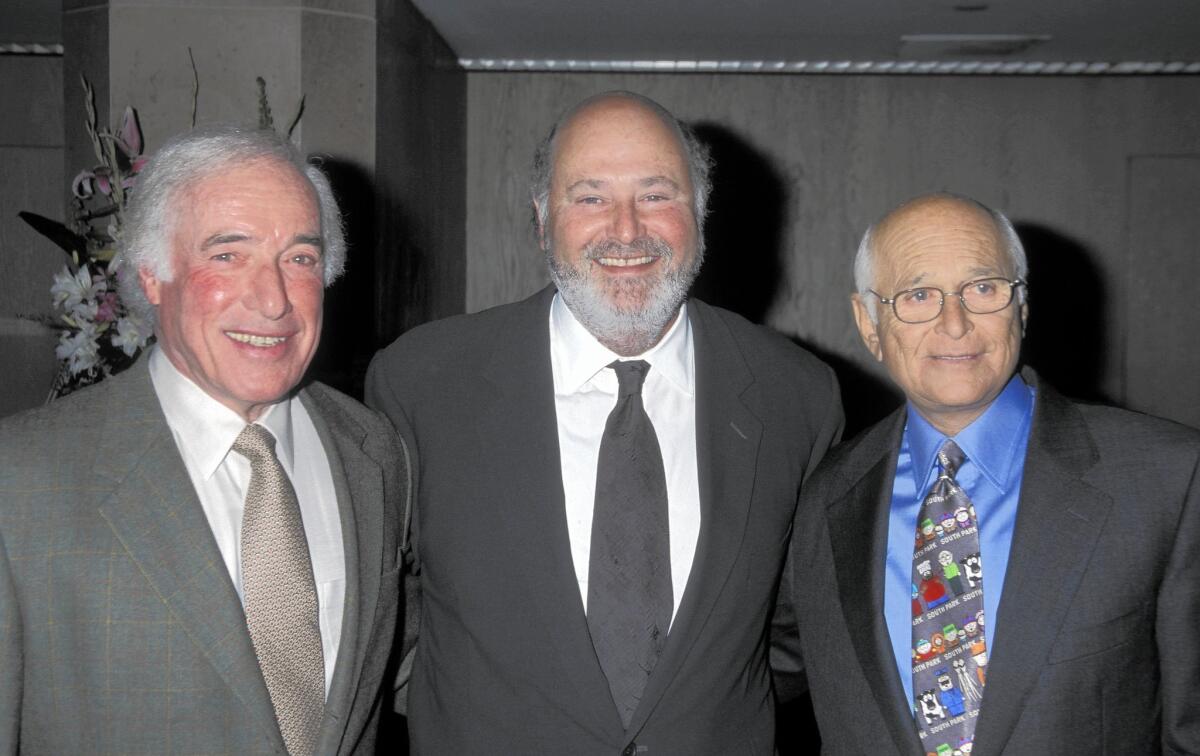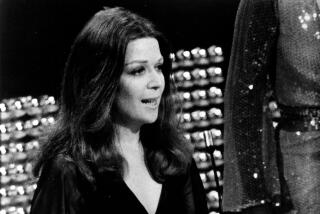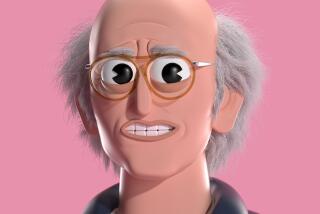Bud Yorkin dies at 89; partner in TV’s ‘All in the Family,’ ‘Sanford and Son’

Bud Yorkin, left, with “All in the Family” star Rob Reiner, center, and partner Norman Lear.
- Share via
Bud Yorkin, a veteran producer-director who brought Hollywood headliners into America’s living rooms through live television in the 1950s before rocking the conventions of network comedy with partner Norman Lear through “All in the Family” and other provocative hits, died Tuesday at his Bel-Air home. He was 89.
His death from natural causes was confirmed by family spokesman Jeff Sanderson.
Yorkin began his career in television’s golden age, when he became one of the most sought-after directors of musical variety shows and specials. He worked with such stars as Jack Benny, Dinah Shore and Tennessee Ernie Ford, and directed Fred Astaire in a dazzling TV debut that won nine Emmys.
“He was certainly one of the great directors of comedy-variety in the ‘50s,” said Ron Simon, curator for television and radio at the Paley Center for Media in New York. “His work with Dinah Shore, Ernie Ford, and ‘The Colgate Comedy Hour’ with Abbott and Costello were really remarkable shows that captured the immediacy and aliveness of television. He capped that off with the Fred Astaire show, which was among the most decorated shows of all time.”
Yorkin went on to a creative partnership with Lear that lasted more than two decades. They made such films as “Come Blow Your Horn” (1963), “Divorce American Style” (1967) and “Start the Revolution Without Me” (1970) before shaking up the sitcom with such sensations as “All in the Family,” “Maude” and “Sanford and Son.”
“His was the horse we rode in on,” Lear said in a statement Tuesday, “and I couldn’t love or appreciate him more.”
Yorkin was working on a movie in London in the late 1960s when he saw “Till Death Us Do Part,” a popular British comedy about an outspoken bigot and his politically opposite son-in-law. It made such an impression on Yorkin that he sent a copy to Lear.
“I said this’ll blow your mind ... what they say about the Queen, what they say about gays,” Yorkin, in an oral history for the Archive of American Television, recalled telling his partner about the show.
Lear proposed adapting the irreverent comedy for American audiences. Yorkin directed one of the pilots that launched “All in the Family,” which starred Carroll O’Connor as Archie Bunker, the unapologetically prejudiced patriarch of a fractious blue-collar family. It made its debut Jan. 12, 1971.
Until then, real life had rarely penetrated the world of the sitcom. Through the 1960s, light, rural-themed comedies such as “The Beverly Hillbillies,” “Petticoat Junction” and “Green Acres” were in vogue. “All in the Family” was urban and used humor to broach serious subjects such as racism, sexism, politics, religion, abortion and homosexuality. The show swept the Emmy awards the year after its debut and ruled the ratings for much of its decade-long run.
It was the first in a stream of sophisticated, half-hour comedies produced by Yorkin-Lear, whose shows had an estimated audience of 120 million Americans by the mid-1970s.
Yorkin played a key role in the development of “Sanford and Son,” which debuted in 1972 along with “Maude,” an “All in the Family” spinoff.
“Sanford and Son” was modeled on another British comedy, “Steptoe and Son,” which revolved around a dissolute Cockney junkman and his highfalutin son.
“It was Bud who said, ‘Let’s do this black and (with) Redd Foxx,’” Lear recalled in a 1998 interview for the Archive of American Television.
Foxx portrayed Sanford, a 65-year old Los Angeles junk dealer in business with his 34-year-old son, played by Demond Wilson.
Yorkin was executive producer of “Sanford and Son,” and also directed some episodes. He was involved to varying degrees in other Tandem shows, including “Maude,” “Good Times” and “Sanford Arms.”
Alan David Yorkin was born in Washington, Pa., on Feb. 22, 1926, the son of Maurice Yorkin and Jesse Sachs. His first cousin was David O. Selznick, who produced the 1939 classic “Gone With the Wind.”
Strong in math and science, Yorkin went to the Carnegie Institute of Technology in Pittsburgh, where he studied electrical engineering. During World War II, he served in the Pacific with the Army Air Forces helping to install sonar systems and other electronics. When he was stationed stateside, he began to think of himself as an entertainer, writing sketches for shows he helped produce at his base in Mississippi.
After the war, in 1948, he earned an engineering degree from Carnegie Tech and moved to New York. He hoped to break into show business as a writer but the closest he could get was repairing television sets.
He found his chance when he was hired to work in NBC’s engineering department. He became known as a good camera operator and began working on top-rated shows such as “Philco TV Playhouse” and Sid Caesar’s “Your Show of Shows.”
He wanted to get into the production side of the business, however, and tried to grab attention by writing critiques of every show he worked on, but his efforts were ignored until he complained about the lack of advancement opportunities as the engineering representative in labor negotiations with the network. A few days later he had a job in the production department.
“I tell that story because everybody wants to know how to get the business. [I tell them] whatever it takes to get your foot in the door,” Yorkin said in the Archive of American Television interview.
He quickly worked his way up to stage manager, then associate director. By 1952, he was directing the “Colgate Comedy Hour,” which featured many of the biggest names in Hollywood, including Frank Sinatra, Phil Silvers, Eddie Cantor, Ethel Merman, Dean Martin and Jerry Lewis. Lear was a writer for the show.
In 1958, Yorkin’s career soared with “An Evening With Fred Astaire,” a special that he produced, directed and wrote. Hailed as innovative and elegant, it won nine Emmys, including two for Yorkin (best writing for a musical, with Herbert Baker, and best direction), who became “an overnight sensation in the musical-variety arena,” Lear later wrote. In 1970, Los Angeles Times TV critic Cecil Smith wrote that the Astaire special remained “perhaps the finest single show in the history of television.”
Yorkin was “one of the three very best live variety directors when live TV was at its peak,” director William Friedkin told The Times recently, adding that Norman Jewison and Dwight Hemion were the other two. “Bud’s style was classic and elegant. His work defined the medium of live television.”
In 1959, Yorkin teamed up with Lear and began producing shows for such stars as Andy Williams, Henry Fonda, Danny Kaye and Carol Channing. “We called ourselves Tandem,” Yorkin said a few years later, “because we think of ourselves as two guys on a bicycle going uphill.”
In 1960, Yorkin won his third Emmy (with Ralph Levy) for best directing in a comedy for “The Jack Benny Hour.”
A decade later he and Lear were, according to the New York Times, “two millionaire kings of television.”
After they ended their creative partnership, Yorkin formed a production company with Saul Turteltaub and Bernie Orenstein, which produced the sitcoms “What’s Happening!!” and “Carter Country.”
Yorkin was an executive producer on the 1982 sci-fi thriller “Blade Runner.” In his biggest solo gamble, he directed, financed and distributed “Twice in a Lifetime” (1985), which starred Gene Hackman as a middle-aged steelworker who divorces his wife (Ellen Burstyn) after he falls in love with a barmaid (Ann-Margret).
Married to feminist leader Peg Yorkin for 30 years until their divorce in 1984, he is survived by his second wife, actress Cynthia Sikes Yorkin; two children from his first marriage, Nicole and David; two children with Sikes, Michael and Jessica; two sisters, Ruth Drazen and Martha Berman; and four grandchildren.
Twitter: @ewooLATimes
More to Read
Start your day right
Sign up for Essential California for the L.A. Times biggest news, features and recommendations in your inbox six days a week.
You may occasionally receive promotional content from the Los Angeles Times.







